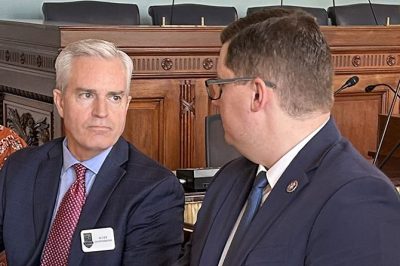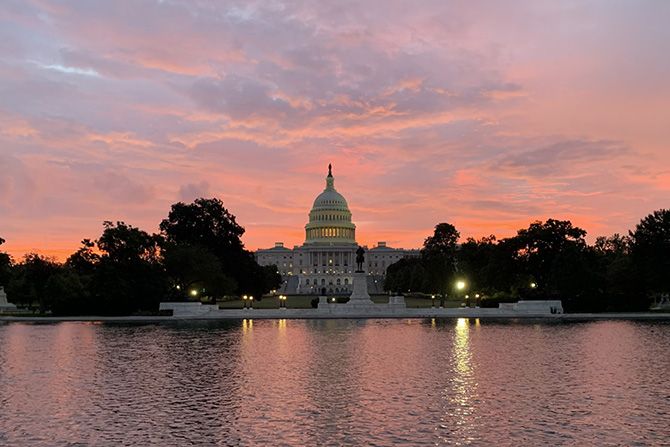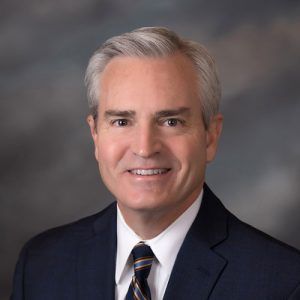
I consider myself very blessed to grow up as a third-generation community banker. Around my house growing up, we could never plan a family vacation over the second Tuesday of the month because that was the day of the board meeting. As a young teenager, I learned how to run the proof machine, be a teller, file checks, clerk farm sales and even repo vehicles and equipment (I’m sure no child labor laws were violated!). I got used to hearing the old timers say, “I got my very first loan from your grandpa …,” etc.
According to KBA records, at one time, there were over 1,300 bank charters in Kansas. Of course, many banks did not survive the Great Depression, and after branch banking laws came into existence in the 1980s-1990s, that number declined to around 625 bank charters. As mergers and acquisitions have continued to take place, combined with a significant increase in regulatory burden, the number of Kansas bank charters has now decreased to 206.
Back in my grandfather’s day, banker engagement with legislators and regulators was predominately limited to the bank President. Federal and State politics, with respect to banking, were not as highly partisan and polarized as they are today. Grandpa’s legislative engagement typically consisted of enjoying a cigar while barbecuing chicken with his U.S. or state representative when they were in town, where they would discuss issues related to banking. Numerous trips to Washington, D.C. or Topeka were not typical. Although community banks did face significant regulatory and legislative challenges, such as regulation of deposit interest rates, anti-competition and insider laws, the heads of the bank regulatory agencies were not highly political, and their efforts primarily focused on bank safety and soundness. Acronyms such as BSA, CRA, HMDA and DFA were not a thing. The Production Credit Association and Farm & Home Administration (aka Farm Credit) pretty much stayed in their lane as a lender of last resort.
Of course, the average community bank in Kansas back in my grandfather’s day looked much different than today. For instance, in 1960, GNBank’s (aka The Girard National Bank) total assets were $2.7 million, which consisted of $1.2 million in total loans and $1.6 million in non-interest bearing demand deposits. The most complex technology in the bank was a two-pocket proof machine, and all transactions were manually posted to ledger sheets.
Just as our community banks have significantly evolved since my grandfather’s day, so must our engagement and advocacy for community banks! We cannot be passive, assuming it is solely the bank CEO, the KBA or ABA’s job to be engaged on the issues. Rather we need to have all of our bank officers, staff, board and even our customers actively engaged in order to ensure our country continues to enjoy the most dynamic and diverse banking system in the world.
I believe the stakes have never been higher. The polarization of our political system seems to be rapidly growing. Well-meaning legislators on both ends of the political spectrum might react to an issue like ESG by introducing bank legislation that results in significant unintended consequences damaging small businesses, farmers and our state and national economy. The heads of federal banking agencies seem to approach the duties of their office in somewhat of an “activist” role to accomplish specific agendas of the administration by which they were appointed.
Not only are the stakes high, but the number of significant issues facing community banks also seems to be growing exponentially. A quick Google search of the history of major federal banking laws found that there were only three or four significant acts passed between 1930-1970, while that number has increased to over a dozen since 1970, with several more on the table at the current time. Of course, not all federal banking acts were created equally, with legislation like the Dodd-Frank Act resulting in scores and scores of sections and sub-sections having a significant impact on our industry.
So how do we as community bankers respond to these challenges? Of course, there are many ways and methods, but let me highlight four:
- Engage directly with KBA, ABA and other banking associations. Whether you are the bank CEO, a member of the board, a loan officer, an operations officer, a compliance officer, IT, HR, CSR, teller or in another area of the bank, you must be engaged. Please do not assume that engagement and advocacy is only the President or CEO’s job. Our associations can only be effective when all bankers are involved, providing direction, perspective and feedback. If you are the bank President or CEO, please allow and encourage your staff’s participation. If you work in another role at your bank, please ask your supervisor or CEO if you can be more engaged.
I am biased, but I firmly believe we have one of the best state banking associations in the country! As I move through the KBA chairs of office, I have become more and more convinced that Doug and Team KBA are the best of the best … they are passionate, articulate and tireless advocates for Kansas community banks. But they can’t do that without our help. Therefore, please stay engaged, whether it be serving on a KBA committee, task force, the board or regular attendance at the KBA’s valuable educational opportunities.
- Engage directly with your federal and state legislators. Although KBA, ABA and other organizations do a terrific job coordinating and strategizing on government relations, these efforts are significantly more effective if we, as bankers and constituents, engage directly with our elected leaders.
Such engagement can start by simply responding to KBA and ABA’s calls to action. However, we should also communicate regularly with our legislators by email, letters, phone calls and face-to-face meetings. Consider hosting legislators at your bank when they are in town. Participate in KBA and ABA trips to Topeka or Washington D.C. when possible. I’ve learned from personal experience that our elected officials genuinely want to hear from the people who elected them! - Engage your bank staff. I understand this is difficult to do, but I am convinced that our engagement must become much more of a “grassroots” granular effort within our banks. As stated above, officers and staff from across the bank should be actively involved in the issues related to their job functions. It is one thing for the CEO to be engaged, but it is exponentially more effective to have our entire team involved!
Unfortunately, our credit union friends have done a much better job at this than the banking industry. When they visit Capitol Hill, they bring hundreds of staff from all areas of their organizations, while the bankers only bring dozens. We must improve our efforts if we are to be successful.
If you are the President or CEO of your bank, please get your staff involved. If you are not, please encourage your bank leadership to do so.
- Inform your customers about key banking issues that will affect them. It is one thing to have our bank staff engaged, but it is quite another thing when our customers become engaged.
A great example of this was last year when an early draft of the Inflation Reduction Act included a provision requiring banks to report all account inflows and outflows over a certain level to the IRS. Our customers, including the press, rallied to call out this bad piece of proposed legislation. Customers flooded their federal lawmakers with calls and emails, protesting the provision. Others wrote op-eds in their local newspapers. Seemingly overnight, this provision disappeared from the Act that was ultimately adopted.
Our customers, whether they are small business owners, farmers or individuals, have by far the most powerful vote when it comes to real issues that may have a direct or indirect impact upon their lives or businesses. Senator Moran said it best at the KBA CEO Summit in Colorado Springs this summer: “I’m not here because of the banks. Rather, I’m here because, like you, I want to do what is best for the businesses, farmers and individuals in your communities.”
As mentioned above, the number of significant issues facing our community banks today are numerous and, to some degree, overwhelming. On some of these issues, like the Access to Credit for Rural Economies (ACRE) Act, we are in a fortunate position to be playing offense, while on other issues (like the CFPB’s Small Business Reporting Section 1071 Rule), we are certainly playing defense. Of course, our very capable KBA team is willing and able to assist bankers in advocating every one of the issues. However, it is our job as bankers to help our customers know which issues need the most priority, as well as to inform and educate them based upon “real-life” experiences from our institutions. They do not have the advantage of dealing with financial policy issues in real-time as bankers do.
For the purposes of this article, I’d like to highlight three key issues that will require a significant amount of time, thought and effort this coming year:
- Section 1071 (Small Business Lending Reporting — aka “HMDA for Small Business Loans”): This legislation was part of the Dodd-Frank Act (DFA) passed in response to the Great Recession (2008-2009). The original provision in the DFA required banks to report 19 data fields for each small business and ag loan made when a customer’s annual revenue is under $5 million.
Unfortunately, during the process of writing the final rule, the CFPB significantly expanded the scope of reporting to a very onerous 81 data fields. The final rule, as written, will have a significant chilling effect on small business and ag lending across the country. This will be a cumbersome burden not only for community banks but also for the small business customers they serve, resulting in less credit availability. A well-intended piece of legislation with the effort to discourage discrimination will result in hurting the businesses and individuals it was intended to help!
I believe this is an issue we must get our customers involved with to help our regulators and legislators see the damage this final rule will create. Most of our customers have no idea Section 1071 even exists, let alone the final rule crafted by the regulators. The customers and farmers I have visited with about this rule have been significantly opposed and extremely upset that Congress and bank regulators would do such a thing. The KBA has crafted a one-page document to hand out to customers describing the basic facts regarding Section 1071, with instructions on how they can easily contact their legislators regarding the issue. I encourage every banker in Kansas to inform their customers about Section 1071 and provide them with the easy-to-use tools they need to take action. - ACRE Act: Thanks to the many years of dedicated and hard work of numerous bankers, legislators, KBA and ABA, we can finally see a potential finish line ahead for the ACRE Act recently reintroduced in both the U.S. Senate and the U.S. House. If enacted into law, farmers and ranchers will directly benefit from lower interest rates for their farm/ranch operations, and small communities across Kansas will benefit from lower interest rates for rural home purchases and new home construction.
However, we haven’t reached the finish line yet. Every community banker in Kansas must be an advocate through active communication with their various local, state and national farm associations, including the Kansas Farm Bureau and the Kansas Grain Commodity Associations (Wheat, Corn, Soybeans and Sorghum), in addition to Kansas rural housing and economic development associations. We need local leaders (mayors, city councilmen, county commissioners, etc.) as well as our rural customers to explain why the adoption of the ACRE Act is crucial for ag producers and rural communities. It is only with the help of our customers and their respective trade associations that we will be able to see this important Act come to fruition. - Credit Card Competition Act (aka “The Big Box Bill” or “Durbin 2.0”): Unfortunately, a handful of federal legislators, including Senate Democratic Whip Dick Durbin (D-IL) and our own U.S. Senator Roger Marshall, have been swayed by big box retailers to favor retail giants the likes of Amazon, Walmart and Kroger over community banks and U.S. consumers. The Durbin-Marshall credit card routing federal mandate will upend the free-market credit card network rails in the U.S. The KBA and ABA have worked tirelessly to educate public and private sector stakeholders about the importance of security, privacy, reliability and efficiency of these important card processing networks and the fact that the Durbin-Marshall plan is nothing more than a multi-billion money grab that will benefit retail giants at the expense of every single credit card consumer. Furthermore, the federal legislators promoting this ill-advised mandate also fail to understand how the loss of credit card points, cash-back rewards and other perks will further disadvantage consumers.
Community bankers must be active in a “grassroots” manner to inform consumers about how the increased security and privacy risks, diminished credit card reward points and diminished cash-back features will negatively impact them. This is an important issue that many consumers may be completely unaware of, and I believe it’s our duty to inform them.
Although the basic premise of community banking has not changed since the days of my grandfather, the issues, culture, regulatory climate, complexity and delivery channels have certainly changed a great deal. Just as our banks have evolved and adapted to these changes, so must our engagement and advocacy for our customers, communities and industry change. I encourage every Kansas banker, regardless of your title, to be engaged! Get your staff colleagues engaged! Get your customers engaged! I’m confident that with these efforts, our nation can enjoy the benefits of a very healthy and diverse community banking system for generations to come.
Mark Schifferdecker







